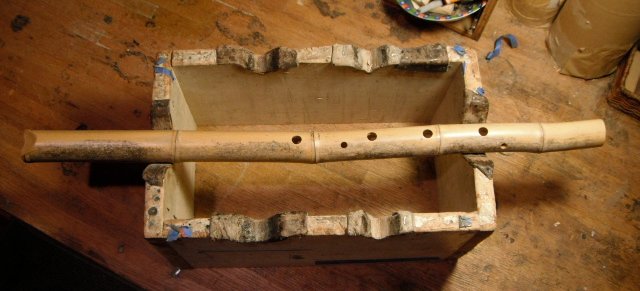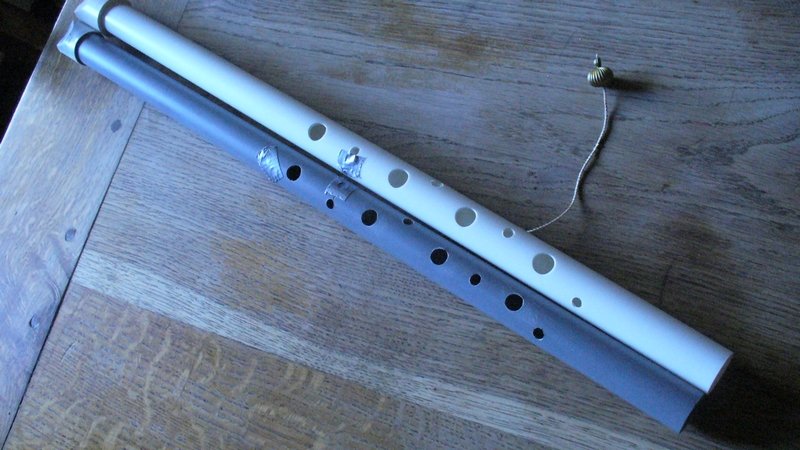How to made 7 and 9 holes shakuhachi
How to made 7 and 9 holes shakuhachi
Bonjour,
je fais d'abord en Français puis tente l'anglais...
voilà je cherche à transformer un 1.8 et un 2.0 5 trous en 7 voir 9 trous: quelqu'un aurait-il des schémas, photos, cotes
avant que je fasse des essais sur du PVC puis sur des bambous? merci bien sur je ferais quelques photos après réalisation...
In english: i'm looking for informations, size, plan, pictures to convert 5 holes 1.8 and 2.0 into 7 and 9 holes...
i will try first on PVC Shak then bambou
thanks
je fais d'abord en Français puis tente l'anglais...
voilà je cherche à transformer un 1.8 et un 2.0 5 trous en 7 voir 9 trous: quelqu'un aurait-il des schémas, photos, cotes
avant que je fasse des essais sur du PVC puis sur des bambous? merci bien sur je ferais quelques photos après réalisation...
In english: i'm looking for informations, size, plan, pictures to convert 5 holes 1.8 and 2.0 into 7 and 9 holes...
i will try first on PVC Shak then bambou
thanks
Bonjour Toots.
It's very difficult to give you specific measurements as each bore on a piece of bamboo will have different specs due to the natural condition or maker. There are also cosmetic considerations. I think your plan on using PVC will definitely point you in the right direction. Then, when you move on to bamboo apply your specs but start with smaller holes and enlarge to the proper pitches as you play.
I converted this Shinzan1.8 last year to a seven-hole. The bottom Tsu Meri tone hole on modern instruments is quite small due to the reach. About 3 - 4mm only. Also, they are almost always near or on a node so you have to decide the best placement not only based on size of hole for tone color but for feeling and aesthetics.
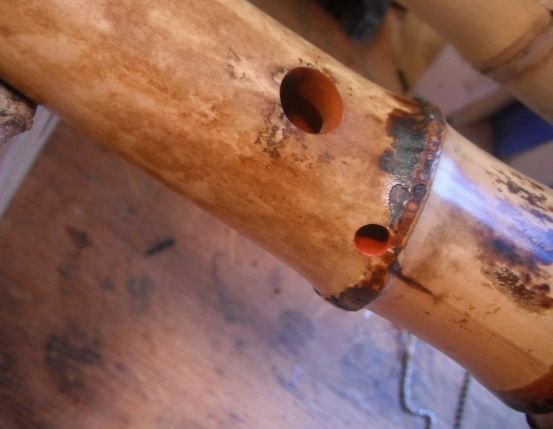
The placement of the Ri meri hole will be tricky as it will fall on the joint of a standard, two-piece modern JIARI flute. If you are lucky, the hole will be on the bottom section. If not, you may have to drill a hole through the tenon (male side) of the joint.
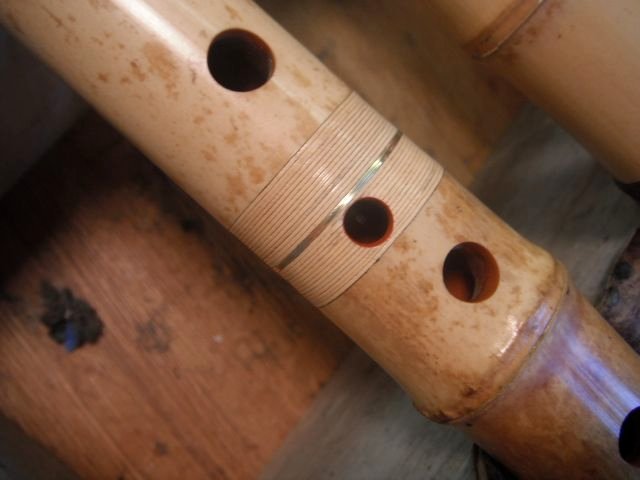
Let us know what happens!
Namaste, Perry
It's very difficult to give you specific measurements as each bore on a piece of bamboo will have different specs due to the natural condition or maker. There are also cosmetic considerations. I think your plan on using PVC will definitely point you in the right direction. Then, when you move on to bamboo apply your specs but start with smaller holes and enlarge to the proper pitches as you play.
I converted this Shinzan1.8 last year to a seven-hole. The bottom Tsu Meri tone hole on modern instruments is quite small due to the reach. About 3 - 4mm only. Also, they are almost always near or on a node so you have to decide the best placement not only based on size of hole for tone color but for feeling and aesthetics.

The placement of the Ri meri hole will be tricky as it will fall on the joint of a standard, two-piece modern JIARI flute. If you are lucky, the hole will be on the bottom section. If not, you may have to drill a hole through the tenon (male side) of the joint.

Let us know what happens!
Namaste, Perry
Thanks Perry!
In fact i have two seven holes from David Brown: 1.8 and 2.1 (i'm sold the 1.8) ....but i'm looking for information to convert a simple 2.0 5 holes i have to 9 holes...i never see 9 holes : i suppose for exemple for 1.8 there is an other little hole for E and other for the F#.
I want to try it with pictures or "mesures exemple" on a 2.0 in PVC before try it on the New student model i've bought for this
Thanks for your answer...and have a good week!
Respectually (and sorry for my english)
Jean-luc Peilhon
In fact i have two seven holes from David Brown: 1.8 and 2.1 (i'm sold the 1.8) ....but i'm looking for information to convert a simple 2.0 5 holes i have to 9 holes...i never see 9 holes : i suppose for exemple for 1.8 there is an other little hole for E and other for the F#.
I want to try it with pictures or "mesures exemple" on a 2.0 in PVC before try it on the New student model i've bought for this
Thanks for your answer...and have a good week!
Respectually (and sorry for my english)
Jean-luc Peilhon
"TOOTS""TOOTS"Thanks Perry!
In fact i have two seven holes from David Brown: 1.8 and 2.1 (i'm sold the 1.8) ....but i'm looking for information to convert a simple 2.0 5 holes i have to 9 holes...i never see 9 holes : i suppose for exemple for 1.8 there is an other little hole for E and other for the F#.
I want to try it with pictures or "mesures exemple" on a 2.0 in PVC before try it on the New student model i've bought for this
Thanks for your answer...and have a good week!
Respectually (and sorry for my english)
Jean-luc Peilhon
Toots Bonjour, s'il vous plaît ne vous excusez pas. Votre anglais est bien meilleur que mon Fench!
J'ai fait un test en PVC d'un moment de retour pour quelqu'un qui pour une flûte grande échelle. Le PVC est bon marché et vous serez en mesure d'obtenir cinq flûtes 2.0 d'une longueur standard de tuyau. Il suffit de copier les emplacements des cinq trous standard de votre 2.0 présenter à l'épreuve de PVC et d'estimer le placement des nouveaux trous. Si vous ne l'obtenez pas dès la première fois, vous aurez la deuxième fois. Encore une fois, commencer petit et plus bas sur la flûte, puis l'agrandir.

Excusez mon traducteur français :)
In English: PVC is cheap. You get five 2.0 flutes out of one long pipe. Just start drilling. :D
bonne chance, Perry
one more time : thanks Perry for that!...
however i should said i'm more curious about 8 or 9 holes shak.
i 'd readden somewhere that there are some of them but i' never saw or listened one...so :
anybody here have some document (pictures, MP3 etc/...) about 8 or 9 shakuhachi? ..
.Not Chinese system , i have two "dong xiao shakuachi" with Chinese holes system) like this
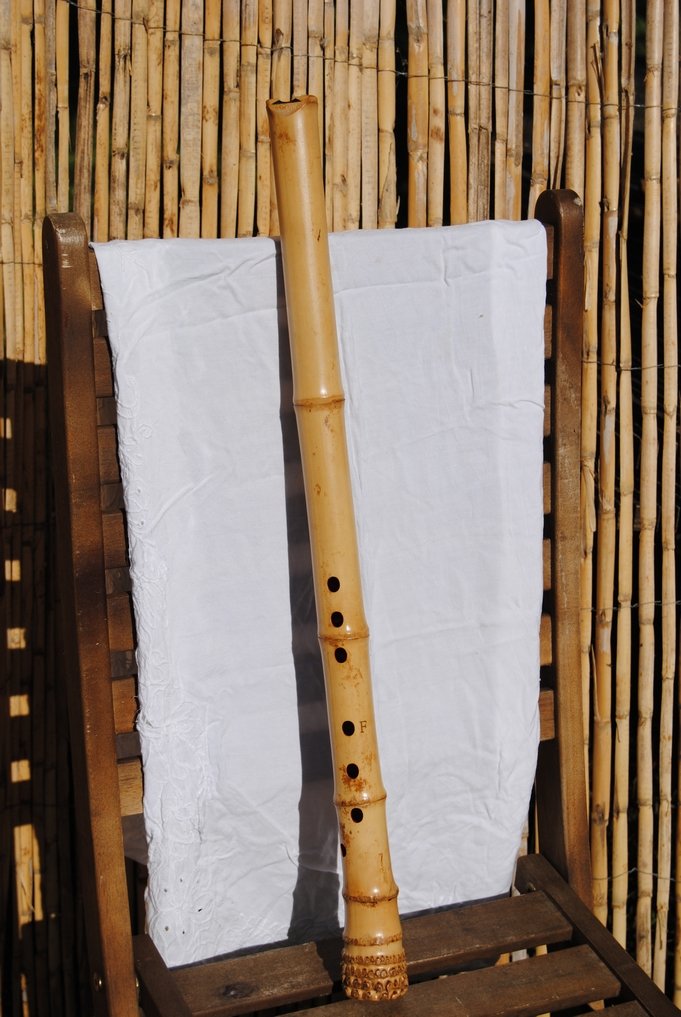
But real shak with extra 8 holes or 9 ...
thanks for your attention
respectually
Jean-luc P
however i should said i'm more curious about 8 or 9 holes shak.

i 'd readden somewhere that there are some of them but i' never saw or listened one...so :
anybody here have some document (pictures, MP3 etc/...) about 8 or 9 shakuhachi? ..
.Not Chinese system , i have two "dong xiao shakuachi" with Chinese holes system) like this

But real shak with extra 8 holes or 9 ...
thanks for your attention
respectually
Jean-luc P
....and Yes Perry i have try on two 1.8 in PVC i have...will send pictures if i 'm not too ashamed about my work...! 

"TOOTS""TOOTS"however i should said i'm more curious about 8 or 9 holes shak. Embarassed
i 'd readden somewhere that there are some of them but i' never saw or listened one...so anybody here have some document (pictures, MP3 etc/...) about 8 or 9 shakuhachi?
I have seen a photo of a short flute with over 8 holes in a CD booklet by Watazumi. I don't have it anymore maybe someone else does. I handled a 1.6 with 9 holes during a lesson with Akikazu Nakamura. It was custom made to play jazz. I didn't take a photo of it
 .
.....and Yes Perry i have try on two 1.8 in PVC i have...will send pictures if i 'm not too ashamed about my work...!
S'il vous plaît faire!
Hi perry
...so you wanted pictures ... i'm punished!
i'm punished!
so that's what i've done with two 1.8 PVC Shaks: one grey i've made during stage with Sensei Tadashi Tajima, other i've buyed from a guy on Ebay... you can see i've tryed differents place for additinal holes... as "gaffa" show it !
i'm not very satisfy and finaly i'm wonder if Chinese system would be beter to have chromatic scale:
i'm use to play also it and exept for C# (for a 2.0) that i must play with mery or cover half first hole, F# is easy to play with special "fingering"
In fact i 'm wonder as i do and prefer for harp if the real solution is to play two different instrument:
-real shak (even 7 holes) for Japonese traditional and modal jazz, some ballad chromatic with slow tempo
- Dongxiao shak for chromatic and real polytonal jazz
Of course i saw vidéo of Bruce and John Kaizan , they are greats player but as Howard Levy or Sebastien charlier for diatonic harp....i find more musical and really chromatic Toots thielemans, Gregoire Marais for exemple on Chromatic harp.
as i do for harmonica, play blues and modal music on diatonic and polytonal, Manouche etc...on chromatic...
You can go on myspace at "Jean-luc Peilhon" or "Totem project", or "Franginsnomad ", on Youtube as MrMargotton to see what i mean...
and here is MP3 of Standard i'm try to play on shak ...traditional ... workin'progress on shak of course!http://www.sendspace.com/file/fgzacn
thanks for your attention
Respectually
Jean-luc P
...so you wanted pictures ...
 i'm punished!
i'm punished!so that's what i've done with two 1.8 PVC Shaks: one grey i've made during stage with Sensei Tadashi Tajima, other i've buyed from a guy on Ebay... you can see i've tryed differents place for additinal holes... as "gaffa" show it !
i'm not very satisfy and finaly i'm wonder if Chinese system would be beter to have chromatic scale:
i'm use to play also it and exept for C# (for a 2.0) that i must play with mery or cover half first hole, F# is easy to play with special "fingering"
In fact i 'm wonder as i do and prefer for harp if the real solution is to play two different instrument:
-real shak (even 7 holes) for Japonese traditional and modal jazz, some ballad chromatic with slow tempo
- Dongxiao shak for chromatic and real polytonal jazz
Of course i saw vidéo of Bruce and John Kaizan , they are greats player but as Howard Levy or Sebastien charlier for diatonic harp....i find more musical and really chromatic Toots thielemans, Gregoire Marais for exemple on Chromatic harp.
as i do for harmonica, play blues and modal music on diatonic and polytonal, Manouche etc...on chromatic...
You can go on myspace at "Jean-luc Peilhon" or "Totem project", or "Franginsnomad ", on Youtube as MrMargotton to see what i mean...
and here is MP3 of Standard i'm try to play on shak ...traditional ... workin'progress on shak of course!http://www.sendspace.com/file/fgzacn
thanks for your attention
Respectually
Jean-luc P
Last edited by JL Peilhon on 2011-11-21, 16:02; edited 1 time in total
Répondre

 have a ggod week-end!
have a ggod week-end!